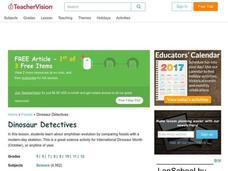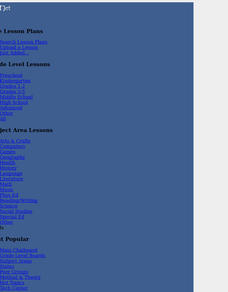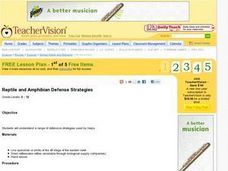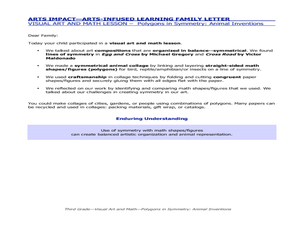Curated OER
Pond Ecology
A lab activity is a great way to incite thoughtful questioning and scientific processes. Pupils will collect organisms with a Petri dish, make observations, sketch the organism, ask questions, then attempt to identify the specimen...
Curated OER
Plant Life Cycles
Follow the life cycle of a dandelion with a lab sheet for kindergartners. They learn about the order of events in a dandelion's life, then put the stages of life in order. Can they describe the life cycle of a pumpkin? For extra...
Curated OER
Animals Belong in Class
In this classifying animals worksheet, students use the information in the word bank to complete the T-Chart about mammals, birds, fish, reptiles, amphibians, and arthropods. Students write 10 answers.
Curated OER
Diversity of Modern Life
Convey classification to your amateur biologists with this bright and bold presentation. After you introduce each kingdom, query your viewers with the included reinforcement questions. Since there are no photos of the different...
Curated OER
Are You Aware?
Bring the five senses to life with a fun science experiment! Kindergartners and first graders read an explanation of the five senses, then identify which items Sophia can sense if she is blindfolded. A science explanation at the bottom...
ARKive
Adaptations to Arid Habitats
How do plants and animals survive in habitats with very little water? Explore arid ecosystems and the way their inhabitants have adapted with a instructional activity and science experiment. After kids listen to a presentation about...
Indian Land Tenure Foundation
Relationships to Places
Young historians take a look at how the Indian tribes of California promoted a mindful relationship between people and the land. They begin to understand how the Indians were champions of conservation, and at preserving the natural...
Novelinks
Tuck Everlasting: Directed Reading Thinking Activity
Encourage close reading for young learners with a lesson based on Natalie Babbitt's Tuck Everlasting. The first part of the resource guides readers through a Directed Reading Thinking Activity (DRTA), prompting them to make...
Curated OER
Dinosaur Detectives
Students examine amphibian evolution by comparing fossils with a modern-day skeleton. They experience the scientific thought process of drawing conclusions from limited paleontological data. Student groups align the figures with the...
Curated OER
Lori Schmidt's Lovely Lesson
Students color code a world map by region to show the different amphibians and reptiles that live there. They discuss the Nile Crocodile, Snapping Turtle, Komodo Dragon, Indian Python, and Lacertidae. When completed, they create a key...
Curated OER
Science: Vocabulary Memory Game
Fourth graders increase their comprehension of science terms by playing a vocabulary matching game. In small groups, they take turns trying to match vocabulary terms with the correct definitions. Missed words are added to the students'...
Curated OER
Reptiles
In this reptiles worksheet, students use an idea map to compare amphibian and reptile adaptations. Students complete 2 short answer questions based on the idea map.
Curated OER
Animal Classification
In this animals worksheet, students match the words in the first column to the statement that best matches. The terms are associated with the different groups of animals. Students must match 17 terms.
Curated OER
Animals That Begin With...
For this animal names worksheet, students follow directions to name animals that begin with various letters of the alphabet. A website reference for additional resources is given.
Curated OER
Reptile and Amphibian Defense Strategies
Students study the stages of the Eastern newt either by collecting a live specimen or from pictures. They note the colors of the eft stage before reading the "Eastern Newt Species Account" that shows the newt's life stages, migration,...
Curated OER
Animal Categories
Pupils sort animal picture cards into classification groups such as mammals, reptiles, amphibians, insects and fish. They discuss the characteristics that each group of animals shares then arrange the pictures into a clasificatioon poster.
Curated OER
Polygons in Symmetry: Animal Inventions
Fourth graders use polygons to create animal figures with symmetry. In this polygons and symmetry lesson, 4th graders create a symmetrical animal collage by cutting and gluing geometric shapes and figures from math activities.
Curated OER
Life Comes in Cycles
Kids are fascinated by chickens and their eggs. Here is a learning exercise has young learners take a look at the four stages in a chicken's life cycle. They have four cycles to organize: egg, chick, young bird, and adult. They have to...
Curated OER
Animals Antonyms and Synonyms Worksheet
Create a cross-curricular connection for your upper elementary language arts kids. There are 15 vocabulary words listed in the chart, and each has to do with exploring different ecosystems. For each word, the learner must find an antonym...
Curated OER
Science Types of Animals and Their Traits
Expose your students to the wonders of scientific vocabulary with this resource. Each slide contains a word and definition related to animal types and traits, concept vocabulary covered includes, traits, animal types, threatened,...
Curated OER
Sunken Millions
This PowerPoint features a game based on the animal life. The interactive slides include 20 questions about animal needs, animal groups, and animal traits. The questions include multiple choice answers and 4 different levels of...
Curated OER
My Animal Book
Don't you just love resources you can print and use? Here is a complete printable packet all about animals. Kids can color the animal pictures, answer animal questions, and complete the animal crossword puzzle, then put them all together...
Curated OER
List Frog Facts
In this frogs learning exercise, students study and color a picture of a frog. On the blank lines below the picture, students write some of the things they have learned about frogs.

























